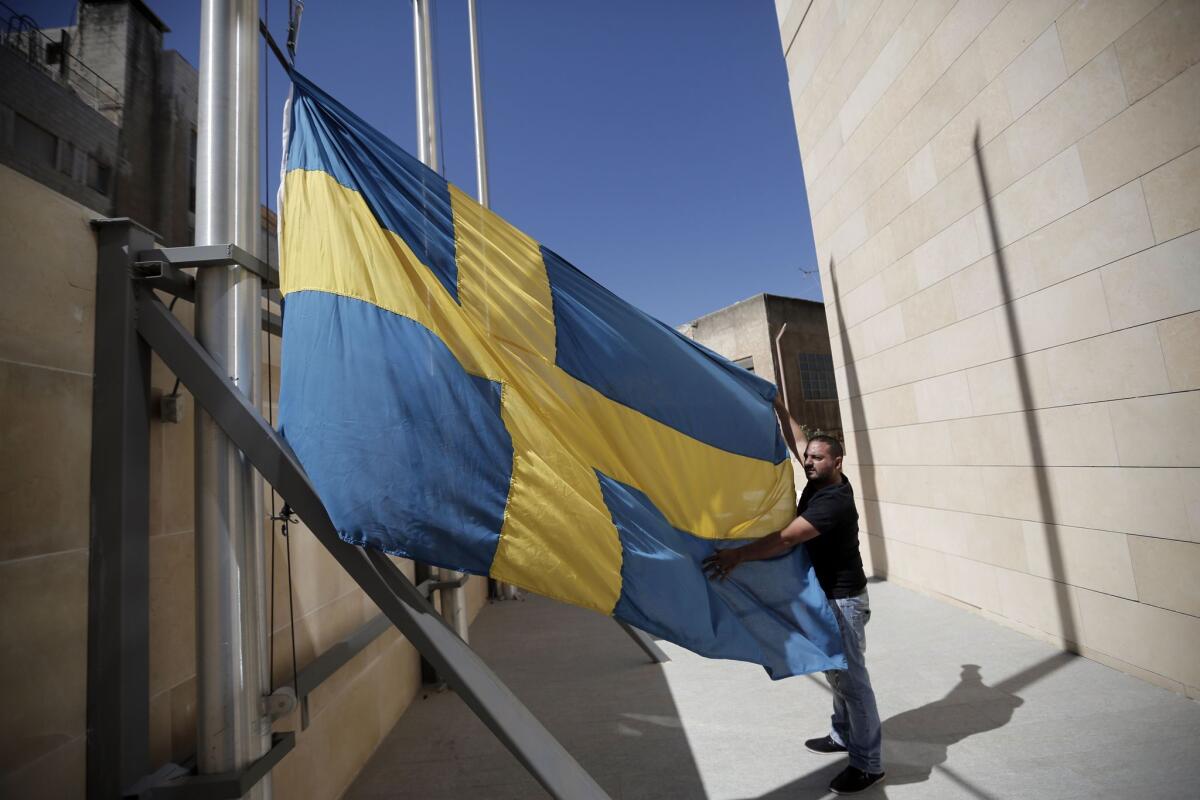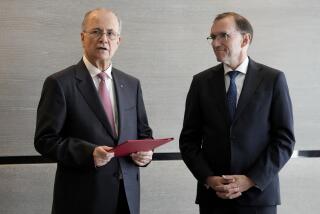Israel alarmed at Sweden’s plan to recognize Palestinian state

- Share via
Reporting from Jerusalem — Responding to a statement by Sweden’s new prime minister that his country would recognize Palestine as a state, Israeli Prime Minister Benjamin Netanyahu cautioned Sunday that such an action will “not promote peace” but impede it.
It was not immediately clear from Stefan Lovfen’s remarks when Sweden intended to formally recognize Palestinian statehood, but Palestinian officials welcomed the move as courageous and historic.
“The time has come for the entire world to recognize the Palestinian state,” said a statement on behalf of Palestinian President Mahmoud Abbas.
This month, the British Parliament is set to discuss recognition of a Palestinian state. An unidentified Israeli official told local news media that Sweden’s move “signifies an unwelcome trend” that could sweep additional countries of influence in the European Union.
Before Netanyahu made his comments Sunday, Israel’s foreign minister, Avigdor Lieberman, issued a biting statement regretting the position Lovfen took in his inaugural speech Friday.
“He apparently has not yet had sufficient time to study the matter and understand it is the Palestinians who have for the past 20 years been an obstacle to reaching an agreement,” Lieberman said.
He instructed ministry officials to summon the Swedish ambassador to Israel for what news media described as reprimanding.
The Israeli minister added that external measures cannot serve as “a substitute for direct negotiations between the parties.”
Lovfen did emphasize in his speech the only possible resolution to the conflict was a negotiated two-state solution that “requires mutual recognition,” the Swedish Embassy reiterated in a statement Sunday evening.
The last round of direct negotiations between Israel and the Palestinian Authority collapsed in April. Worsened by the war in Gaza, mistrust between Israelis and Palestinians leaders was reflected in their recent trade of barbs before the United Nations General Assembly.
Palestinians have drafted a proposed resolution for the United Nations Security Council calling for recognition of statehood and an Israeli withdrawal from Palestinian areas within two years. Israel objects to the move and the U.S. is expected to veto the resolution if it passes.
Separate talks between Israeli and Palestinian negotiators for a long-term agreement on Gaza will resume in Cairo after the Jewish and Muslim holidays.
Meanwhile, Israeli and Palestinian officials have met to discuss a series of pressing, practical matters regarding Gaza so that reconstruction efforts can begin.
Other steps to ease restrictions on Gaza being discussed include permitting some exports, travel for worship and access to academic studies out of Gaza.
Last week, 30 tons of sweet potatoes were exported from Gaza to Europe for the first time since 2007, when Israel imposed a blockade after Hamas seized control of the strip.
On Sunday, hundreds of worshipers from Gaza visited the Al Aqsa mosque in Jerusalem’s Old City after Israel allowed 500 residents older than 60 to travel for the Muslim holiday -- also for the first time in seven years. Many had not visited the holy sites in decades.
The Israeli nonprofit Gisha, which fights for freedom of movement and rights in Gaza, welcomed this and other alleviating measures but called for an end to what it called Israel’s “failed closure policy.”
Sobelman is a special correspondent.
More to Read
Sign up for Essential California
The most important California stories and recommendations in your inbox every morning.
You may occasionally receive promotional content from the Los Angeles Times.













